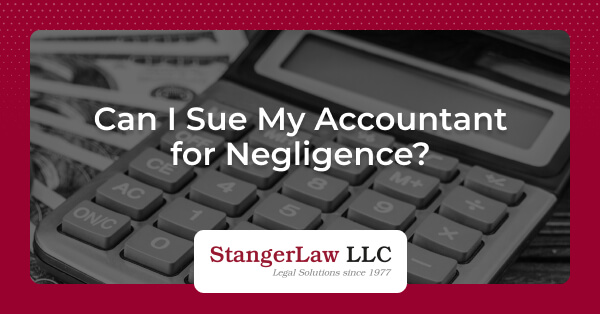Can I Sue My Accountant for Negligence?

Accounting malpractice may not get the attention of medical malpractice.
Nevertheless, it is a serious problem.
Like any profession that maintains professional standards, accountants must perform their duties with a certain level of care.
When a negligent accountant fails in that duty, the law holds them responsible for the results.
If you or your business has suffered losses due to an accountant’s negligence, you may sue an accountant for negligence.
To schedule a consultation to discuss your accountant’s conduct, please contact our Connecticut accounting malpractice lawyers by filling out our online form or calling (860) 561-0651 today.
Our Practice is Limited to Connecticut
We handle two types of accounting malpractice claims (6 figures+):
- Claims for penalties and interest caused by failure to pay taxes due to accountant or attorney malpractice (we do not seek recovery of unpaid taxes that were rightfully owed).
- Claims for taxes wrongly paid due to accountant negligence, but only if the deadline for filing an amended return has passed.
Accounting Standards

Professional accountants typically abide by a set of rules known as “Generally Accepted Accounting Principles” or GAAP, issued by the Financial Accounting Standards Board (FASB).
The American Institute of Certified Public Accountants (AICPA) has a code of professional conduct that outlines principles of responsibilities and due care for members.
The standard of care in the community of accountants can also be used. The AICPA also provides accounting standards specific to audits, tax preparation, consulting services, and valuation services and sets forth “Generally Accepted Auditing Standards” (GAAS).
Accountants must follow specific accounting rules and regulations such as GAAP, GAAS, and any other standards, rules, and regulations applicable to the situation.
If an accountant assumes the legal liabilities of an accountant but fails to abide by the rules of the profession and their client suffers financial losses, this failure may provide a basis for a negligence claim.
Many cases may be the result of negligence independent of these standards. We know how to handle that as well.
Common Mistakes by Accountants
When an accountant fails to adhere to professional standards for accounting, it can lead to a negligence claim.
Examples of accounting negligence could include:
- Tax overpayments,
- Inaccurate tax returns,
- Improper auditing or compilation of financial statements,
- Failing to discover employee embezzlement,
- Failing to identify weak points in a client’s safeguards and controls, and
- Calculation errors.
- Failing to File
- Failing to advice the client of the ramifications of certain decisions.
All accounting mistakes do not mean that your accountant was negligent. You must have suffered financial losses from the misconduct to have a case worth bringing. If you believe you may be the victim of a negligent accountant, you should save all documents relating to the losses and contact an accounting negligence lawyer.
What Is Accounting Negligence?
Regardless of the applicable professional accounting standards, accountants owe a duty of care to their clients. Failure to fulfill these duties can cause significant monetary losses.
To prevail in a case of accounting negligence, a plaintiff must prove that:
- The accountant owed a duty of professional care to their client;
- The accountant failed to measure up to their duty of care, which may involve failure to follow GAAP, GAAS, AICPA, or other standards;
- The plaintiff suffered measurable and verifiable monetary losses; and
- The breach of duty was the cause of the client’s harm or loss.
Generally, a plaintiff who prevails in an accountant negligence action can receive full compensation for the money they lost due to accountant negligence.
Can I Sue My Accountant for Negligence?
When you suspect that your accountant may have been negligent, you should get your case evaluated by an experienced accounting negligence attorney. You have a limited time to act.
Connecticut’s statute of limitations gives you three years from the date of the alleged misconduct to initiate litigation for a professional negligence claim. Good news, there is often a theory whereby we can extend this time period. We can help you figure this out.
An attorney can explain your legal options and help determine whether it’s in your best interest to sue the accountant for negligence.
At the end of the day, the driving factor is often how much damage was suffered. Just like a negligent driver who does not hit anything, a negligent accountant may not be worth the time, and expense associated with filing the suit if the damages collected at the end of the day dont justify the effort. .
Contact an Experienced Connecticut Accounting Negligence Attorney
If your accountant deviated from professional accountant standards or the standard of care of other accountants in the community, and left you with significant financial losses, contact StangerLaw LLC.
Due to the complexity of an accounting negligence case, we highly recommend that you consult with an experienced Connecticut accountant negligence attorney. They local car accident lawyer may not have the experience and understanding of this type of claim. We can evaluate whether you should sue the accountant for negligence.
If an accounting negligence case is the next step, we can help build your case.
We have offered our clients quality legal services for over 40 years. We would be pleased to help you assess your accounting negligence case. Contact us online or call (860) 561-0651 today for a consultation.